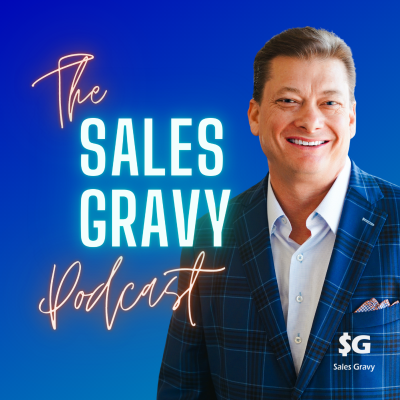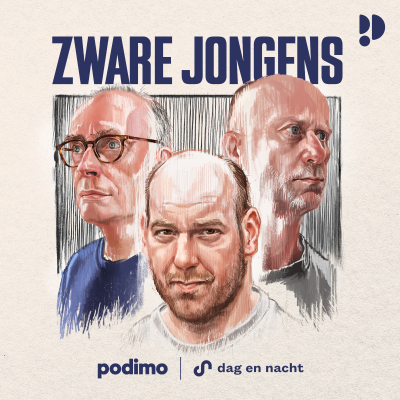
Sales Gravy: Jeb Blount
Podcast door Jeb Blount
Tijdelijke aanbieding
2 maanden voor € 1
Daarna € 9,99 / maandElk moment opzegbaar.

Meer dan 1 miljoen luisteraars
Je zult van Podimo houden en je bent niet de enige
4.7 sterren in de App Store
Over Sales Gravy: Jeb Blount
From the author of Fanatical Prospecting and the company that re-invented sales training, the Sales Gravy Podcast helps you win bigger, sell better, elevate your game, and make more money fast.
Alle afleveringen
480 afleveringenCold calling terrifies most salespeople more than losing their biggest account. The rejection. The hang-ups. The voice telling you that you're bothering people who don't want to hear from you. Before transitioning into sales, Steve Munn spent nine years as a professional hockey defenseman. As a hockey player, his job was to make life difficult for the other team and absorb whatever they dished back. "Part of it was getting punched in the face," he said on a recent episode of the Sales Gravy Podcast. "If I get a no from a prospect, that's maybe a bad day, but it's certainly not as bad as getting a concussion or a broken nose again." That perspective shift, understanding what actually constitutes a threat, changes everything about how you approach cold calling. It goes beyond being tougher or having thicker skin. Your Fear Isn't About the Call Most sales professionals will do anything to avoid call blocks. They'll update their CRM. Reorganize their pipeline. Respond to emails that could wait three days. Anything but pick up the phone. The problem isn't the person on the other end of the line. You don't want to be the one who fumbles, doesn't have the right answer, or proves you don't belong in that conversation. Imposter syndrome thrives in sales because every call is another opportunity to prosecute yourself. Every objection becomes evidence that you're not cut out for this. Every hang-up confirms what you secretly suspected: You're bothering people who have better things to do. That internal narrative is all in your head, and it's costing you deals. Get Your Mind Right First You can't make effective cold calls when you're living in your head. Anxiety, overthinking, or trying to sound perfect makes every conversation feel forced. Nothing bad actually happens on a sales call. Your life isn’t in danger, and a hung-up phone or curt “not interested” barely registers as a problem. The best cold callers aren't fearless. They're prepared mentally before they start dialing. Find what gets you into the right frame of mind: review recent wins, remind yourself that you’re solving real problems, or call a colleague for perspective. The goal is connecting with another human, not executing a perfect pitch. People can tell the difference. Separate Message From Delivery When someone says "we're all set" and hangs up, they're not making a judgment about your worth as a salesperson or a human being. They're communicating one thing: They're not interested right now. The delivery might feel harsh, and the tone might sound dismissive. But the message is simple and impersonal. Athletes learn this early. Coaches scream. Teammates criticize. Opponents talk trash. If you react emotionally to how something is said rather than hearing what's actually being communicated, you become ineffective. In sales, the same principle applies. When you stop taking the delivery personally, you can actually hear what's being said. Sometimes what sounds like a hard no is actually "you haven't given me a reason to care yet" or "call me back in six months." You Don’t Need to Know Everything One of the biggest barriers to cold calling is the belief you must have all the answers. You hesitate because you think, "What if they ask something I don't know? I'll look like a fool." Here's what that thinking misses: You have a team. No salesperson operates in a vacuum. You've got service teams, technical experts, partners, and colleagues who collectively know far more than you do individually. The expectation that you should show up with encyclopedic knowledge is self-imposed and unrealistic. What matters on a cold call isn't demonstrating expertise. It's demonstrating curiosity and commitment. When you release yourself from the pressure to be perfect, cold calling becomes about investigation rather than performance. Ask Questions Nobody Else Does Most salespeople treat cold calls like a race to present their solution.
Here's a question that keeps startup founders up at night: How does a first sales hire build pipeline and prospect effectively when there's zero technology, no tools, and absolutely no data resources available? That's the challenge Matthew Russell brought to the table, and it's a scenario that's far more common than you'd think. Companies transitioning from founder-led sales often throw their first sales hire into the deep end with nothing but a laptop and a "good luck" pat on the back. If you're nodding your head right now, you're not alone. But here's the good news: Some of the most successful sales teams were built from exactly this position, and there's a proven playbook for making it work. The Hook Is Everything When Will Frattini joined his boss Jane in Austin back in 2011, they had zero presence in the market. No reputation, no established relationships, no fancy tech stack. Just two people and a mission to build from scratch. The first lesson? Your job isn't to reinvent the wheel or create some elaborate sales process. Your job is to figure out what hook the founder used to close their first deals, then ruthlessly replicate it. This means getting the founder to show you exactly how they won business. Listen to their calls. Shadow their meetings. Mirror their approach. Don't try to be clever or add your own spin yet. Just learn what actually works. Here's the critical part: You need the founder to be completely honest with you about your early meetings. Will's boss had the right to refuse any meeting he set. If it didn't qualify, she'd tell him exactly why. That feedback loop is gold because it teaches you the difference between a meeting that sounds good and a meeting that actually advances the sale. Master the fundamentals before you try to optimize. The Metrics That Actually Matter Forget about creating a complex sales process with seventeen KPIs. In the beginning, you need exactly one metric that matters: qualified meetings that convert to next steps. Will's early goal was 20 to 30 worthwhile meetings per month. Eventually they scaled that to 60 per rep. But notice the word "worthwhile." These weren't just any meetings. They were conversations with real potential that the founder or sales leader validated. The qualifier matters because it forces you to get better at targeting and messaging, not just activity for activity's sake. You can't game this system by booking junk meetings. Victoria Walker asked how long it takes to build metrics in a niche market, and the answer is simple: You'll have metrics after day one. How many calls did you make? How many connections? How many appointments set? But most new outbound teams trip up because they expect instant results, don't see them, and quit before the cumulative impact kicks in. The 30-Day Rule Changes Everything The prospecting you do today pays off in the next 90 days. This is the rule of cumulative impact, and it's why most outbound efforts fail. Companies start strong, don't see immediate results, and abandon ship. Then they restart six months later with different reps, different messaging, and the cycle repeats. This is death by fits and starts. Your commitment has to be ironclad: We're doing this every single day for at least 90 to 120 days before we make major changes. You'll make small tweaks to messaging and targeting along the way, but you don't stop the engine. Think of it like an elite sports team watching game film. You're looking for incremental improvements. Last month you closed five good deals. This month you're aiming for six. You're not rebuilding the entire playbook every two weeks because the metrics look scary. Handling the "How'd You Get My Number?" Objection D'elvis Huerta raised a challenge every salesperson faces: Prospects who are surprised or even concerned when you call their personal cell phone. They ask how you got their information, and it throws you off your game.
Cicero once said, "Cultivation of the mind is as necessary as food to the body." Sales is fundamentally a mental game. Your capacity for understanding your prospects at a deeper level and developing creative solutions that solve their problems—that's your winning edge. In a profession where you need to outwit and out maneuver your competitors to win, your ability to think, to truly contemplate and reflect, might be the most underutilized competitive advantage in your sales arsenal. Always Responding. Never Reflecting. Yet most salespeople these days are starving their minds. They're constantly in motion, constantly busy, constantly doing, constantly in front of screens—but rarely thinking. We've created a culture where being busy equals being productive. Most salespeople spend their days reacting to emails, to phone calls, to urgent requests, to the latest fire that needs to be put out. We are always responding, never reflecting. Always moving, never thinking strategically about where we are going. Noise Kills Your Ability to Think William Penn wrote, "True silence is the rest of the mind; it is to the spirit what sleep is to the body, nourishment and refreshment." Think about that for a moment. You wouldn't dream of going weeks without sleep because you know your body would break down. But you regularly go weeks, maybe months, without giving your mind the silence and space it needs to just think and function at its highest level. We live in the age of noise. Constant noise. Digital noise, physical noise, mental noise. Your phone is buzzing with notifications. Your email is pinging every few minutes. Your CRM is demanding updates. Your manager wants reports. Your prospects are texting. Your colleagues and customers are interrupting. We have so many things going on at once and so much noise in our lives that it has become almost impossible to think. All of this noise is killing your ability to think clearly, to make good decisions, to see the big picture, to be the creative and thoughtful professional you were meant to be. Schedule Thinking Time That's exactly why scheduling thinking time is so important. Most people don’t take the time to think because they don’t feel like they can afford to. Sitting quietly and thinking doesn't feel like work. It feels like you're being lazy. Our culture has programmed us to believe that if we're not visibly doing something, we're not being productive. Likewise, constant stimulation has become a drug. Silence feels uncomfortable because we've forgotten how to be alone with our thoughts. I passionately believe that we must schedule, on our calendars, time for thinking. No distractions, no music, no TV, no laptop, no phone—just you and your thoughts, alone. Notice I said "schedule" it. If you don't put it on your calendar, it won't happen. You'll always find something more "urgent" to do. Thinking Time Taking time to just think is powerful. It slows you down, helps you relax, and frequently generates incredible ideas and inspiration. Thinking time isn't meditation, though it shares some similarities. It's not prayer, though some people find it spiritual. It's simply dedicated time for your mind to process, reflect, and contemplate. The beauty of thinking time is that it can take many forms. The Quiet Corner Think Find a quiet space like your office with the door closed, a park bench, your car in an empty parking lot, or a corner of your home. The location doesn't matter as much as the lack of distractions. Start with just 15 minutes. Don't try to go for an hour right away. Build the habit first, then extend the time. The Walk and Think This is my personal favorite. Take a long walk alone, without music, podcasts, or phone calls. There's something about the rhythm of walking that unlocks creative thinking. Steve Jobs was famous for his thinking walks. Many of his best ideas came while walking around Apple's campus or through his neig...
Most salespeople lose a sales meeting before they ever open their mouth. They show up with decks of slides, lists of discovery questions, or AI-generated talking points, thinking preparation is about having more material. But while they’re busy organizing, their prospects are mentally checking out—and the meeting hasn’t even started. Lee Salz, bestselling author and founder of Sales Architects, has observed this pattern for decades. "If you want to win more deals at the prices you want, you need a better first meeting strategy. Everyone says I want to win more deals, so they focus on closing at the end. But that's not where the opportunities are. The opportunities to win more deals start in that first meeting." The Sales Meeting Problem Hiding in Plain Sight Ask any salesperson: "If a prospect agrees to meet with you, what do they get out of it?" The response is usually stunned silence. That silence reveals the problem. Too many sales professionals approach the first sales meeting with an extraction mindset, focused on what they can learn instead of what they can give. Think about how you prepare. Do you make a list of questions to gather information? Do you pull together slides about your company, products, and clients? That might feel productive, but here’s what it communicates: This meeting is about me. When prospects can’t see immediate value in the conversation, they resist. They may decline the meeting altogether, or worse—they show up already skeptical, arms crossed, counting down the minutes until they can escape. Why Traditional Discovery Is Failing You Sales training has conditioned reps to believe that discovery meetings are the foundation of the sales process. In theory, this makes sense: You need information to qualify opportunities. But here’s the problem—buyers don’t experience value when they educate you. They already have suppliers, vendors, and service providers. Another salesperson asking them to “tell me about your challenges” just feels like more work. Worse, traditional discovery feels like an interrogation. You’re pulling data without leaving anything behind. And prospects are savvy enough to sense when you’re there to take rather than give. The Emotion Gap in Every Sales Meeting You already know people buy on emotion and justify with logic. You’ve heard it in every sales book, every training, every keynote. Walk into the average first meeting, and you’ll see the same setup: a rep armed with facts, features, processes, and pricing structures. All logic, zero emotion. The result? Buyers nod politely, take notes, and then ghost you. Not because your product isn’t good enough, but because you failed to make them feel anything. Your competitors who are consistently winning aren’t necessarily better at selling features. They’re better at weaving emotional connection into the very fabric of their meetings. They create trust, credibility, and resonance in the first 15 minutes. The Three Non-Negotiables of Every Winning Sales Meeting High-performing sales professionals understand that every first meeting must accomplish three core objectives: Meaningful Qualification: Determine whether this opportunity aligns with your ideal customer profile while also helping prospects better understand their situation. Clear Differentiation: Prospects need to understand what makes your approach unique, but not through feature comparisons. Real differentiation comes from your methodology, philosophy, and approach. Show them how you think about solving problems, not just what you sell. Emotional Foundation: Establish the connection that energizes deals. This involves demonstrating genuine interest in their success while positioning yourself as a trusted advisor rather than just another vendor. How to Prepare for Sales Meeting Success The outcome of the meeting is decided long before you show up. Top performers treat preparation like a competitive advantage.
You know AI is transforming sales, everyone's talking about it, but you're still staring at ChatGPT like it's some mysterious black box, wondering what magical question you should type in first. That's the reality for most salespeople even now. They know they need to embrace AI, they've heard the success stories, but they're paralyzed by the complexity and overwhelmed by the options. If you're nodding your head right now, you're not alone. The biggest barrier to AI adoption isn't technical—it's mental. Salespeople are asking the wrong question entirely. The Wrong Question That's Keeping You Stuck Most people approach AI like it's some mystical oracle they need to appease with the perfect question. They think there's some secret prompt that will unlock AI's full potential, like finding the right combination to a safe. They're wrong. There is no perfect first question for AI. The real problem isn't what to ask—it's how you're thinking about the problem. Instead of asking "What should I ask AI?" you need to flip the script entirely. The Mental Shift That Changes Everything Twenty minutes before recording our latest Ask Jeb episode, I was working on a new training program for Sales Gravy University. I had a slide deck and workbook that needed proofreading, and my first instinct was to think, "Who can I get to proofread this thing?" That's how most of us think: "How can someone else do this?" or "How can I get this done?" But I caught myself and asked a different question: "How can AI do this?" I uploaded the slide deck to AI and asked it to proofread for me. Fifteen seconds later, I had a response—not perfect, but a starting point. I refined my prompt, asking for typos organized slide by slide, and boom—seven minutes later, the entire deck was cleaned up. What would have taken me 45 minutes and still resulted in missed errors was done in minutes, with better accuracy than I could achieve manually. Why You're Already Qualified to Use AI Will Frattini from ZoomInfo pointed out that "You already know how to use AI. You've been doing it for years." If you've ever asked Siri for directions, told Alexa to turn up the music, or typed a question into Google—congratulations, you've been using AI. The only difference now is the sophistication and power of what's available. The barrier isn't technical competency. It's the mental block of overthinking it. You don't need to understand large language models or machine learning algorithms. You just need to ask a question and hit enter. That's it. That's the profound simplicity everyone's missing. Think Like a Conductor, Not a Solo Act Stop thinking of yourself as someone who needs to learn AI. Start thinking of yourself as a conductor standing in front of a symphony orchestra. You've got Claude for certain tasks, ChatGPT for others, ZoomInfo Copilot for prospecting intelligence, Gemini for research—each AI is like a different instrument in your orchestra. Your job isn't to play every instrument; it's to conduct them all to create something beautiful. The apex predators in sales aren't going to be the people who master one AI tool. They're going to be the conductors who know when to use which AI for maximum impact, iterating and refining until they get exactly what they need. This means developing your prospecting methodology becomes even more critical. You need to know what outcome you're trying to achieve before you can direct your AI orchestra to help you get there. Your Practical Starting Point Stop overthinking this. Here's your action plan: Step 1: Pick one AI tool you have access to right now. Your company probably already provides something. If not, start with ChatGPT, Claude, or any of the major platforms. Step 2: Identify one recurring task that eats up your time. Email templates, research, call preparation—anything that's necessary but not your highest value activity. Step 3: Ask the AI how it can help with that specific task.

Meer dan 1 miljoen luisteraars
Je zult van Podimo houden en je bent niet de enige
4.7 sterren in de App Store
Tijdelijke aanbieding
2 maanden voor € 1
Daarna € 9,99 / maandElk moment opzegbaar.
Exclusieve podcasts
Advertentievrij
Gratis podcasts
Luisterboeken
20 uur / maand

































